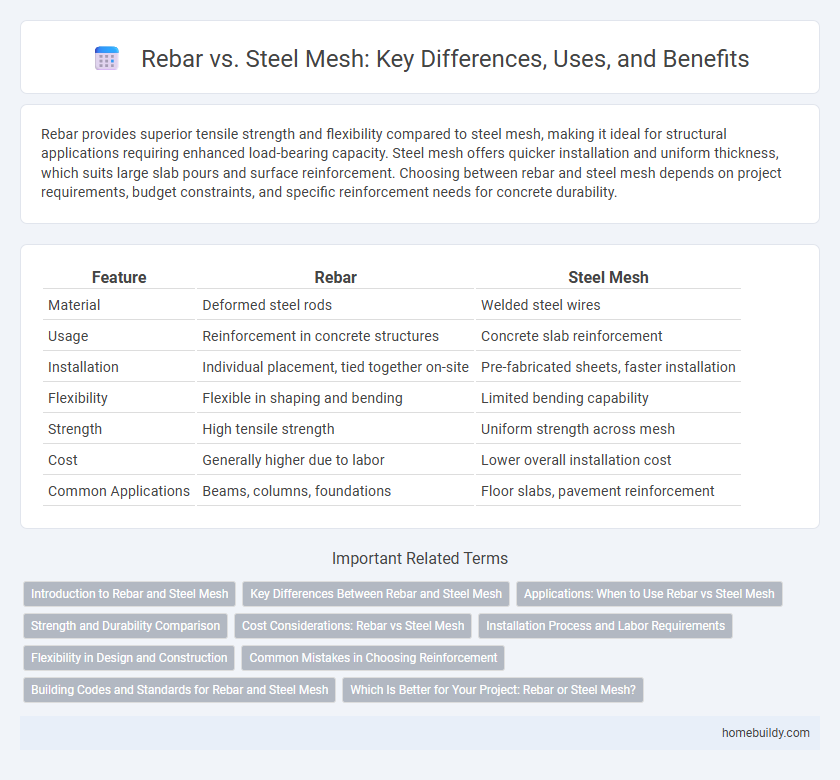Rebar provides superior tensile strength and flexibility compared to steel mesh, making it ideal for structural applications requiring enhanced load-bearing capacity. Steel mesh offers quicker installation and uniform thickness, which suits large slab pours and surface reinforcement. Choosing between rebar and steel mesh depends on project requirements, budget constraints, and specific reinforcement needs for concrete durability.
Table of Comparison
| Feature | Rebar | Steel Mesh |
|---|---|---|
| Material | Deformed steel rods | Welded steel wires |
| Usage | Reinforcement in concrete structures | Concrete slab reinforcement |
| Installation | Individual placement, tied together on-site | Pre-fabricated sheets, faster installation |
| Flexibility | Flexible in shaping and bending | Limited bending capability |
| Strength | High tensile strength | Uniform strength across mesh |
| Cost | Generally higher due to labor | Lower overall installation cost |
| Common Applications | Beams, columns, foundations | Floor slabs, pavement reinforcement |
Introduction to Rebar and Steel Mesh
Rebar, or reinforcing bar, is a steel bar used to strengthen concrete structures by providing tensile strength and reducing cracking. Steel mesh, also known as welded wire fabric, consists of a grid of steel wires welded together to support concrete slabs and surfaces uniformly. Both materials enhance concrete durability, with rebar offering targeted reinforcement and steel mesh providing distributed structural support.
Key Differences Between Rebar and Steel Mesh
Rebar consists of steel bars or rods used to reinforce concrete, providing tensile strength and structural support in construction projects. Steel mesh, also known as welded wire mesh, is a grid of steel wires welded together, offering uniform distribution of load and resistance to cracking over large surface areas. Key differences include rebar's higher load-bearing capacity and ability to anchor into concrete, while steel mesh is easier to install and ideal for slab reinforcement and preventing surface cracks.
Applications: When to Use Rebar vs Steel Mesh
Rebar is ideal for heavy-duty structural applications requiring high tensile strength, such as foundations, beams, and columns in commercial and industrial construction. Steel mesh excels in slab reinforcement, driveways, and sidewalks, providing uniform crack control and easier installation for lighter loads. Choosing between rebar and steel mesh depends on load-bearing requirements, concrete thickness, and the complexity of the structural design.
Strength and Durability Comparison
Rebar offers superior tensile strength compared to steel mesh, making it ideal for reinforcing concrete structures subjected to heavy loads and dynamic stresses. Steel mesh provides uniform distribution of reinforcement but lacks the high load-bearing capacity of rebar, limiting its use in critical structural applications. Rebar's durability is enhanced by its thickness and deformed surface that improves bonding with concrete, resulting in longer-lasting structural integrity under various environmental conditions.
Cost Considerations: Rebar vs Steel Mesh
Rebar generally offers lower material costs compared to steel mesh, making it a cost-effective choice for large-scale concrete reinforcement projects. Steel mesh installation, however, can reduce labor expenses due to faster placement and reduced tie requirements, potentially balancing out higher upfront material costs. Evaluating total project expenses requires analyzing both material pricing and labor efficiency to determine the most economical reinforcement method.
Installation Process and Labor Requirements
Rebar installation involves tying individual steel rods into a grid, requiring skilled labor and precise placement to ensure structural integrity, which can extend project timelines. Steel mesh comes pre-fabricated in rolls or sheets, allowing faster installation with fewer laborers and reduced on-site handling. The choice between rebar and steel mesh significantly impacts labor costs and installation efficiency due to differences in setup complexity and required expertise.
Flexibility in Design and Construction
Rebar offers superior flexibility in design and construction due to its ability to be easily cut, bent, and shaped on-site, accommodating complex architectural requirements and irregular structural forms. Steel mesh, while providing uniform reinforcement and faster installation, is limited by preset panel sizes and shapes, reducing adaptability in intricate or customized projects. This makes rebar the preferred choice for constructions requiring precise reinforcement detailing and varied geometries.
Common Mistakes in Choosing Reinforcement
Choosing between rebar and steel mesh often leads to common mistakes such as underestimating load-bearing requirements and overlooking project-specific structural demands. Many professionals err by assuming steel mesh suits all slab reinforcement needs, while rebar provides superior tensile strength for heavy duty applications. Failure to evaluate factors like concrete thickness, flexural strength, and environmental conditions can result in compromised structural integrity and increased maintenance costs.
Building Codes and Standards for Rebar and Steel Mesh
Building codes such as the ACI 318 and ASTM standards govern the use of rebar and steel mesh in concrete construction, ensuring adequate strength and durability. Rebar must comply with ASTM A615 or A706 specifications, while steel mesh typically adheres to ASTM A185 standards for welded wire reinforcement. These codes dictate minimum yield strength, spacing, and installation practices to meet structural safety and performance requirements.
Which Is Better for Your Project: Rebar or Steel Mesh?
Rebar offers superior tensile strength and flexibility, making it ideal for projects requiring high load-bearing capacity and structural integrity. Steel mesh provides uniform distribution of reinforcement and is easier to install for slab applications, enhancing crack resistance in concrete surfaces. Choosing between rebar and steel mesh depends on specific project demands, with rebar favored for heavy structural support and steel mesh suited for thinner slabs and flooring.
Rebar vs Steel Mesh Infographic

 homebuildy.com
homebuildy.com